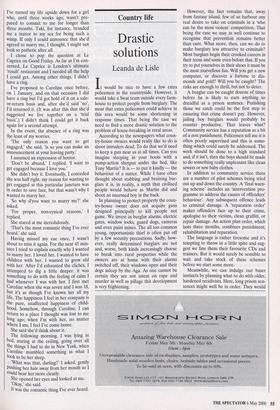Country life
Drastic solutions
Leanda de Lisle
I t would be nice to have a few extra policemen in the countryside. However, it would take a Swat team outside every farm- house to protect people from burglary. The most that extra policemen could achieve in this area would be some shortening in response times. That being the case we need to find a more drastic solution to the problem of house-breaking in rural areas.
According to the newspapers what coun- try-house owners would really like to do is shoot intruders dead. To do that we'd need to keep a gun near us at all times. Can you imagine sleeping in your boots with a pump-action shotgun under the bed, like Tony Martin? It is — to put it kindly — the behaviour of a nutter. While I have often thought about stabbing and braining bur- glars it is, in reality, a myth that civilised people would behave as Martin did and shoot an unarmed boy in the back.
In planning to protect property the coun- try-house owner does not acquire guns designed principally to kill people not game. We invest in burglar alarms, electric gates, window locks, guard dogs, cameras and even paint mines. The all too common young, opportunistic thief is often put off by a few security precautions. Sadly, how- ever, really determined burglars are not and, worse, both kinds increasingly choose to break into rural properties while the owners are at home with their alarms switched off, their windows open and their dogs asleep by the Aga. As one cannot be certain they are not intent on rape and murder as well as pillage this development is very frightening. However, the fact remains that, away from fantasy island, few of us harbour any real desire to take on criminals in a 'who can be the most violent' competition. That being the case we may as well continue to recognise that prevention remains better than cure. What more, then, can we do to make burglary less attractive to criminals? Most burglars begin their crooked careers in their teens and some even before that. If you try to put yourselves in their shoes it must be the most marvellous fun. Will you get a new computer, or discover a fortune in dia- monds and gold? Will you be caught? The risks are enough to thrill, but not to deter.
A burglar can be caught dozens of times before he is likely to earn anything so dreadful as a prison sentence. Punishing those we catch could be the first step to ensuring that crime doesn't pay. However, jailing boy burglars would probably be counter productive. That leaves what? Community service has a reputation as a bit of a non punishment. Policemen tell me it is often poorly supervised and this is some- thing which could surely be addressed. The work should be done to a high standard and, if it isn't, then the boys should be made to do something really unpleasant like clean sewers or sew baby clothes.
In addition to community service there are a number of pilot schemes being tried out up and down the country. A 'final warn- ing scheme' includes an 'intervention pro- gramme to address the causes of offenders' behaviour'. Any subsequent offence leads to criminal damage. A 'reparation order' makes offenders face up to their crime, apologise to their victims, clean graffiti, or repair damage. An action plan order, which lasts three months, combines punishment, rehabilitation and reparation.
The language is rather tiresome and it's tempting to throw in a little spite and sug- gest we fine them their favourite CDs and trainers. But it would surely be sensible to wait and take stock of these schemes before we start some more.
Meanwhile, we can indulge our baser instincts by planning what to do with older, hardened recidivists. Here, long prison sen- tences might well be in order. They would serve as a warning to the young as well as keeping the old pros out of our homes and a man's blood off our hands.



































































 Previous page
Previous page